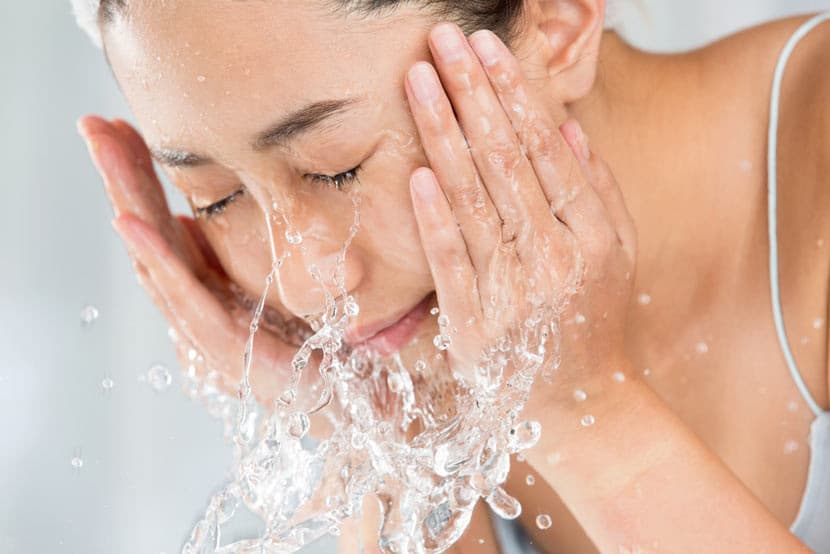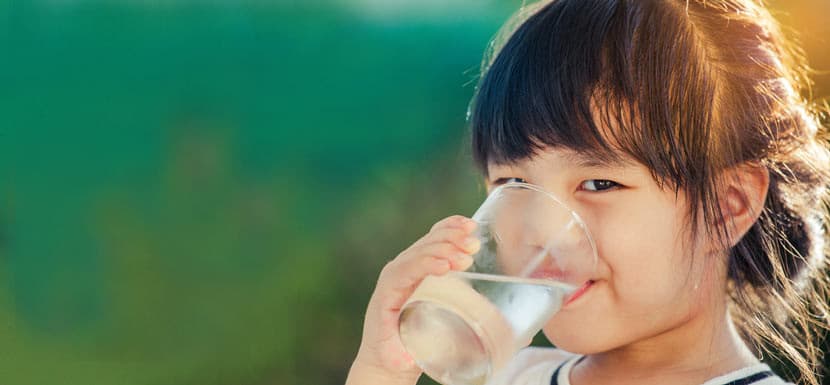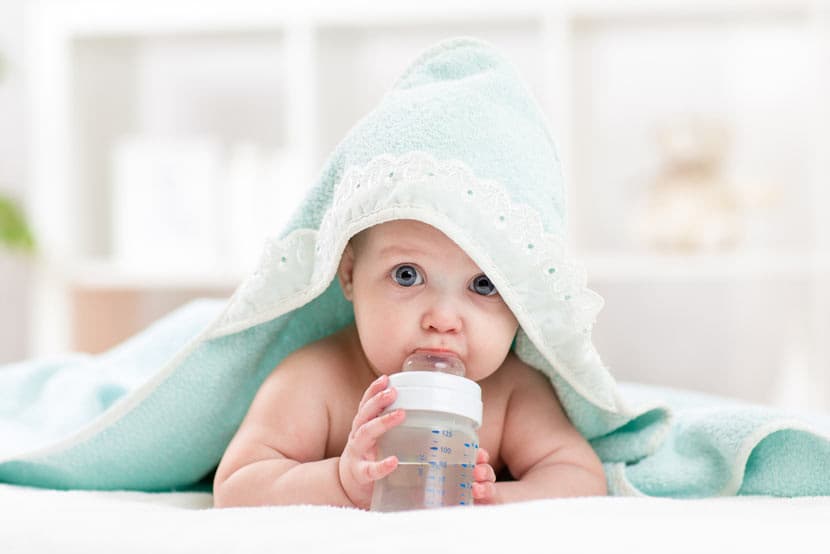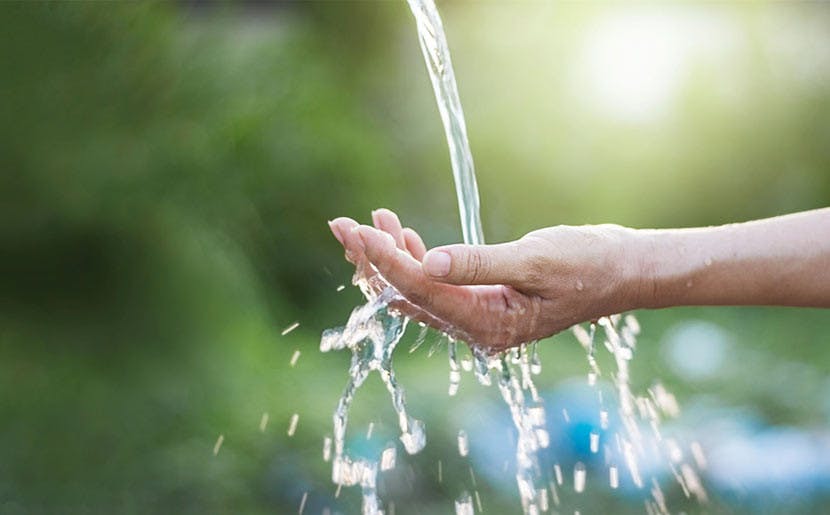How Much Water Should I Drink A Day?
Article by:
Amazing Discoveries™ |
16 min read
Water is the essence of life. Every cell in our bodies relies upon adequate supplies of water. Water accounts for 70% or more of the total cell mass1 of each of our 30 trillion cells. The brain is even more dependent upon water, which composes around 80% of its mass.2 All our tissues, vital fluids, and secretions also contain a large percentage of water. It regulates the body's temperature, acts as a medium for cellular reproduction, and keeps tissues soft and permeable. Water is the basic component of all living things.
Importance of Hydration
On top of all this, water is an all-purpose cleanser both inside and out of the body. It is an abundant and effective agent for washing away dirt, germs, and bacteria. Internally, water acts as a bath for the digestive system, cleansing and refreshing it. If we could follow the stream of water into the hidden places of our bodies, we would see it washing away the poisons in the blood as it circulates through the kidneys. Even being slightly dehydrated makes the kidneys work harder. Giving the body enough water to dilute and easily transport wastes makes the kidneys’ job easier.

The body also eliminates waste products through the skin. Cleansing away these impurities by bathing helps to keep us healthy. In addition, hydrotherapy, external hot and cold water treatments, have long been used to treat disease and assist the body in healing itself. Although it’s often taken for granted, the use of water can bring about rapid and dramatic healing.
Water Research
Fereydoon Batmanghelidj, a physician imprisoned during the Iranian Revolution, discovered water’s amazing curative properties when he was called upon to help a fellow inmate who was suffering from intense ulcer pain late one night. He told the man to drink two glasses of water and within eight minutes, the pain was gone. Impressed with the result, Dr. Batmanghelidj prescribed two glasses of water every three hours for six weeks which cured the man’s ulcer.
The doctor began prescribing this water cure to other ulcer sufferers in the prison. He later reported, “During the 2½ years in prison, I must have seen well over 3,000 patients with ulcer symptom.”3 Although drug treatment was available to inmates, once word got around on the success of the water cure it quickly became the preferred treatment. “The almost total lack of demand for antacid from the pharmacy during the last few months was an indicator of the success of this treatment,” Dr. Batmanghelidj reported.
After his release from prison Dr. Batmanghelidj delved into research on water and shared his findings in his book, Your Body’s Many Cries for Water. Dr. Batmanghelidj says one of the greatest tragedies in medicine is diagnosing dehydration only after a patient complains of having a dry mouth because dry mouth presents as a symptom long after dehydration begins within the body. Based on his own experiences and research, he believes that dehydration is often misdiagnosed as disease. Why? Because dehydration triggers a histamine response in the body, causing many disease symptoms which are typically treated with drugs. Dr. Batmanghelidj points out that 90% of drugs on the market are strong antihistamines which suppress the body’s dehydration signals and many patients could recover health if they simply drank enough water. Growing children are especially sensitive to dehydration, which can result in asthma, stunted growth, mental and emotional problems, and DNA damage, he says.

All the chemical processes by which the body operates require an adequate supply of water in order to keep the body functioning at peak efficiency. If water is not made available, the body consequently suffers and cannot do its work properly. A lack of water dehydrates the fluids, tissues, and cells of the body. It causes the blood to thicken, increasing the risks of stroke and heart disease. Dehydration can also mimic hypoglycemia, cause headaches, tiredness, and fainting spells.
Dehydration Symptoms and Disease
Symptoms of mild dehydration include:
- increased pain sensitivity4
- decreased cognitive performance5
- increased tension/anxiety and fatigue6
- headache,7 and
- lower back pain8
The brain is 80% water so it’s not surprising that even low levels of dehydration cause trouble. Dehydration can affect short term memory and attention.9 Dehydration headaches are thought to be caused by fluid loss in the meninges, the lining around the brain. Dehydration can also trigger migraines.
What might come as a surprise is that lower back pain may also be a symptom of dehydration. Adequate water intake is crucial for healthy discs which are 85% water in weight. The weight of our bodies is supported by these spongy discs. When they lose water, simply holding the body up becomes painful because of the increased pressure on nerves in the spine.

An article in Nutrtion Today that was based on an international conference on hydration noted that after just 30 minutes of physical exertion, noticeable changes in the body occur due to even low levels of dehydration. At just 1% body water loss, muscular endurance and work capacity decrease, your body is less able to regulate temperature, and cognitive performance declines.10
The article also states that, “There is strong evidence for an association between chronic systematic mild dehydration and urolithiasis (formation of stones in the urinary tract), urinary tract infection, venous thromboembolism (blood clots in the veins), hyperglycemia in diabetic ketoacidosis (high blood sugar which can result in diabetic coma), and mitral valve prolapse (heart valve malfunction). There is evidence, but less strong, for an association between chronic mild dehydration and constipation, hypertension, coronary heart disease, stroke, dental disease, gallstones, and glaucoma. The evidence for a link between local mild dehydration and bronchopulmonary disorders, such as exercise asthma and cystic fibrosis, is moderately strong.”11 Obviously, the need for adequate hydration cannot be overstated. Yet, according to some reports, 75% of Americans may be dehydrated.
Dehydration Symptoms
Here are ten signs you may be dehydrated.
1 |
Headache. When you don’t drink enough water, your brain and the membranes around it shrink and this puts pressure on nerves which causes pain. This is such a common phenomenon that it has its own label: “dehydration headache.” |
2 |
Constipation. Adequate water is needed at every stage of digestion. Hard, dry or infrequent stools are a sign of dehydration. |
3 |
Dizziness. A drop in blood volume can result in lower blood pressure. This can cause dizziness or a feeling of being lightheaded when you stand up. |
4 |
Hunger. Sometimes we confuse the body’s thirst signals with hunger and end up eating instead of drinking. If you think you’re feeling hungry even after you’ve eaten, try drinking some water instead. |
5 |
Dark urine. Urine that is darker than very pale yellow is a sign of dehydration and that wastes are concentrated and the kidneys are working harder than they should be. |
6 |
Fatigue. When you’re dehydrated, your blood volume is lower and less oxygen gets to all your cells. If you’re feeling tired, try rehydrating for a boost of energy. |
7 |
Overheating. Even mild dehydration reduces the body’s ability to regulate temperature. To stay cool, you need to stay well hydrated. |
8 |
Dry mouth. Certainly not the first sign of dehydration, nevertheless a dry mouth is a sure sign of dehydration. When your mouth feels dry, you need to rehydrate sensibly. |
9 |
Cramping. If your muscles are spasming or cramping, it can be a sign of dehydration and of electrolyte imbalance. |
10 |
Sagging skin. Try the pinch test. If your skin stays in a peak when you pinch it before slowly returning to normal, you may be as much as 10-20% dehydrated. Begin sipping water with Celtic salt to rehydrate. Be cautious as too much water at once can dilute electrolytes which can be life threatening. |
Hydration Needs at Different Life Stages

Healthy newborns are about 80% water. But as we age, our body composition changes, and we literally dry out. Older adults may be only 45% water by weight.13 Not surprisingly, dehydration is a serious concern for older adults, especially in hot environments. Part of the problem is that our ability to detect thirst is blunted with age, so older adults may not feel thirsty even when they’re dehydrated.
And even though babies and small children are wetter, dehydration is a concern for them as well, especially in cases of illness and hot environments. In addition, children’s drinking behavior is set in toddlerhood14 so establishing a habit of drinking enough water early in life is important for healthy physical development and optimal cognitive performance. However, a disturbing recent study found that on a given day, 20% of children and youth drank no water at all. Not a drop.
How Much Water Should I Drink a Day?
In 2005, a report was published establishing a dietary reference intake for water.15 The report did not set a recommendation for how much water should be drunk each day. Instead, the report provided information on what it called Adequate Intake for total water. These figures were based on what seemed to be adequate hydration levels in those studied. The report said that men who seemed to be adequately hydrated consumed 3.7 liters of water from all sources (beverages and food), and women who seemed to be adequately hydrated, on average, consumed 2.7 liters of water from all sources.
It’s important to note that nobody really knows what “adequate hydration” is and that adequate hydration is highly individualized. Researchers can’t agree on the best way to measure whether a person is adequately hydrated or not. One study,16 though, found that when adults consumed less than 1.8 liters of water over 24 hours, the nervous and endocrine systems responded to protect body water. So, the eight-glasses-a-day rule is probably a good starting point for adults.
Lifestyle educator Walt Cross shares an easy formula for determining your appropriate water intake. Divide your weight (in pounds) by half and drink that many ounces of water. So someone who weighs 200 pounds should drink 100 ounces of water each day just to maintain basic functions. Dividing 100 ounces by 8 translates into 12.5 cups or a little more than 3 quarts (or liters). However, depending on many factors, this may not be enough for you to support optimal health. When it’s hot, if you’re sick, exercising, or stressed you should drink more.
Another way to tell if you’re drinking enough is to monitor the color of your urine. An article published by Cleveland Clinic recommends, “Your urine should fall somewhere between colorless and the color of light straw and honey.”17
Only Water Works
Other beverages are unable to purify like water. Soda and coffee can no more clean the inside of your body than they can the outside. Pure plain water is the best way to replace the fluid you need. Many sugar-laden beverages actually result in a loss of water from the system, because it requires more water to metabolize the sugar in a drink than the drink itself provides. Caffeine and alcohol are both diuretics which cause the body to lose water. You need an extra glass of water for every high-sugar, caffeinated, or alcoholic beverage you drink.
When to Drink
It’s important to rehydrate first thing in the morning because we lose water while we sleep. Drinking a glass or two of water when you rise stimulates the digestive system and prepares the stomach to receive food. Water thickens the mucosal lining of the stomach, protecting it against erosion from stomach acid. Water is also needed for the production of digestive fluids. A minimum of two liters of water each day is needed for making adequate amounts of digestive juices for each meal you’ll eat tomorrow. Today’s hydration affects tomorrow’s digestion.
Drinking water with meals dilutes the gastric juice and slows the digestive process. That’s why the best time to drink water is between meals. A good rule to follow is to stop drinking half-an-hour before a meal and wait an-hour-and-a-half to two hours after a meal before drinking water again.
Pure Water
Not too many years ago, pure water could be found easily; but humankind has been extremely careless and has contaminated most water supplies. To remedy our carelessness, we have resorted to the use of chemicals in the water supply in an attempt to purify it.
Fluoride
One great menace is fluoride. Water fluoridation began in the United States in 1945 when drinking water was fluoridated to a level of 1 ppm to prevent dental cavities. But fluoride is hazardous to human health. Potential and adverse effects of fluoride ingestion through fluoridated water include cognitive impairment, hypothyroidism, dental and skeletal fluorosis (chronic metabolic bone disease), enzyme and electrolyte derangement, and cancer.
There are many types and brands of water filters on the market and new filters are being introduced all the time. But most water filters cannot remove fluoride, even if they’re labeled as “fluoride filters.” Reverse osmosis systems can remove fluoride, but while some remove all fluoride to a non-detectable level, others do a poor job. So be sure to do your research before investing in a filter.
Water and Salt

Surprisingly enough, hydration is closely connected to salt, but not in the way you may think.
Do you sometimes feel like all the water you drink just goes right through you? You try to drink enough water but it doesn’t seem to hydrate you, but just increases your need to urinate? Many people have this complaint. Think of a dry houseplant that hasn’t been watered for a while. When you finally go to water it, it just runs off the top because the soil is not able to absorb it. The body can also have difficulty absorbing water when it has been chronically dehydrated.
When it comes to dehydration, a few crystals of sea salt can be helpful.
To maintain a proper balance between the fluid inside and outside the cells, our bodies also need a regular supply of minerals. Some of these come from salt. Table salt contains only two minerals, sodium and chloride, and should not be used as it causes an imbalance in the fluid in and around the cells. The use of table salt is connected with blood pressure problems.
In contrast to table salt, unrefined sea salt contains 82 minerals. Sea salt harvested from the Celtic sea - part of the Atlantic bordered by Ireland, Wales, England, and France - is distinguished by its moist look and feel. Celtic sea salt is high in magnesium and magnesium attracts water. The magnesium in the salt is carried through the blood, crosses the cell membrane and draws water with it. Before drinking a glass of water, dissolve a crystal of Celtic sea salt on your tongue. The magnesium in the salt is carried through the blood, crosses the cell membrane and draws water with it. You can do this two or three times a day to boost energy levels.
How much water should I drink a day? Maybe more than I’ve been getting. Drinking more water is a small change that comes with big benefits for our health.
Recommended Resources
Walt Cross on Water
https://adtv.watch/8-keys-to-optimal-health/water-are-you-getting-enough
These statements have not been evaluated by the Food and Drug Administration or Health Canada. Our articles, videos and products are not intended to diagnose, treat, cure, or prevent any disease. If you are pregnant, nursing, taking medication, or have a medical condition, consult your physician before following any recommendations or using any product on our site. You assume sole responsibility for your personal health, and you must use your own discretion under doctor consultation to determine whether any product or recommendation on this site is suitable for your personal situation.


